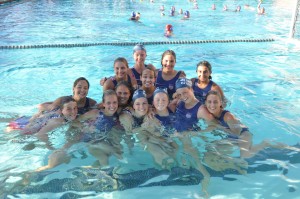Must Read: Mark Meeker’s 2014 Internet Trends
Noted Social Media Scholar to Discuss How the Frequency of College Students’ Facebook Usage Correlates to Academic Engagement on #CollegeChat June 5th
Professor Rey Junco will discuss recent research on college students’ Facebook use #CollegeChat on June 5, 2012 at 9 p.m. Eastern
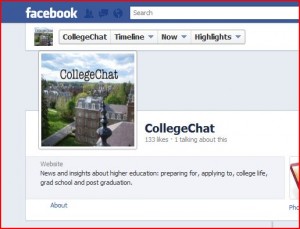 Dr. Rey Junco, professor at Lock Haven University and a youth and media lab mentor at the Berkman Center for Internet & Society at Harvard University, will discuss his latest research on the relationship between Facebook use and college student engagement on #CollegeChat June 5, 2012 at 9 p.m. Eastern.
Dr. Rey Junco, professor at Lock Haven University and a youth and media lab mentor at the Berkman Center for Internet & Society at Harvard University, will discuss his latest research on the relationship between Facebook use and college student engagement on #CollegeChat June 5, 2012 at 9 p.m. Eastern.
During #CollegeChat, Junco (http://twitter.com/reyjunco) will discuss research findings from a recent study he authored “The relationship between frequency of Facebook use, participating in Facebook activities, and student engagement” with attendees including:
- Is there a relationship between frequency of Facebook use and activities and student engagement?
- Is there a relationship between frequency of Facebook use and activities and time spent preparing for class?
- Is there a relationship between frequency of Facebook use and activities and time spent in co-curricular activities?
- Why are these results important for higher education administrators, faculty and staff important?
- Why is it important for higher education to design and support interventions that meet students where they are on Facebook and other social media sites?
Rey Junco is a social media scholar who investigates the impact of social technologies on college students. Rey’s primary research interest is using quantitative methods to analyze the effects of social media on student psychosocial development, engagement, and learning. His research has also focused on informing best practices in using social technologies to enhance learning outcomes. For instance, Rey’s research has shown that technology, specifically social media like Facebook and Twitter, can be used in ways that improve engagement and academic performance. Rey has recently published papers on: the relationship between Facebook use, student engagement, and learning, the academic effects of multitasking, the digital divide in cell phone ownership and use, using social media to promote civil discourse on college campuses, and how Twitter can be used for academic purposes in order to increase student engagement and improve grades.
About #CollegeChat
#CollegeChat is a live bi-monthly conversation intended for teens, college students, parents, and higher education experts on Twitter. #CollegeChat takes place on the first and third Tuesday of the month at 6 p.m. PT/ 9 p.m. ET. Questions for each #CollegeChat edition can be sent to Theresa Smith, the moderator of #CollegeChat via http://Twitter.com/collegechat, by entering questions online on the CollegeChat Facebook page or by email. More detailed information about signing up for Twitter and participating in #Collegechat can be found at http://pathwaypr.com/how-to-participate-in-a-twitter-chat .
What’s the Price of Higher Education? An Infographic
 Source: H&R Block
Source: H&R Block
I like this infographic a lot but only as a starting point. Note, the colleges noted as the most expensive school are not necessarily so. They are the most expensive in sticker price but a large number of students do not pay the sticker price. That’s where your grades, course load, SAT and ACT scores, financial need, your athletic or musical talents play a huge part in what you will actually pay. Go to the schools and check out their financial aid section to find out how much is actually doled out. Make sure to aim for schools where your GPA, scores, talents will place you in top 25% of admitted students.
#CollegeChat Transcript: How to Evaluate Colleges Financially with Lynn O’Shaughnessy
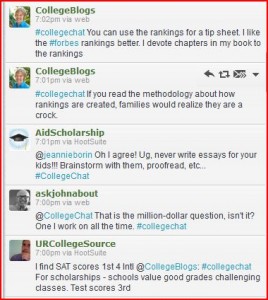 Last night, Lynn O’Shaughnessy, a bestselling author and higher education journalist, shared advice from her newly published book The College Solution: A Guide for Everyone Looking for the Right School at the Right Price (2nd Edition) during #CollegeChat on Twitter.
Last night, Lynn O’Shaughnessy, a bestselling author and higher education journalist, shared advice from her newly published book The College Solution: A Guide for Everyone Looking for the Right School at the Right Price (2nd Edition) during #CollegeChat on Twitter.
We had an interesting discussion revolving around how to find the right school at the right price. We covered the following topics:
- What are the biggest sources of college money.
- How can you increase your chances of qualifying for merit scholarships.
- How can you evaluate the generosity of a school before applying.
- Where to find the best online tools to evaluate colleges.
- What do families of divorce need to know about financial aid.
- How to use net price calculators.
You can read the entire 34 page transcript here Collegeblogs Transcript 5-15-12
Best Selling Higher Education Author Lynn O’Shaughnessy to Provide Advice on How to Evaluate Colleges #CollegeChat May 15th
O’Shaughnessy to discuss advice from her new book “The College Solution: A Guide for Everyone Looking for the Right School at the Right price (2nd Edition)
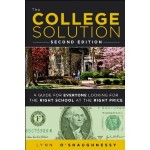 Lynn O’Shaughnessy, a bestselling author and higher education journalist, will share advice from her newly published book The College Solution: A Guide for Everyone Looking for the Right School at the Right Price (2nd Edition) during #CollegeChat on Twitter, May 15, 2012 at 9 p.m. Eastern.
Lynn O’Shaughnessy, a bestselling author and higher education journalist, will share advice from her newly published book The College Solution: A Guide for Everyone Looking for the Right School at the Right Price (2nd Edition) during #CollegeChat on Twitter, May 15, 2012 at 9 p.m. Eastern.
O’Shaughnessy wrote the second edition of her book “so you too can become an empowered consumer.” During #Collegechat, O’Shaughnessy, https://twitter.com/#!/collegeblogs , will discuss key information parents and students need to know including:
- What are the biggest sources of college money.
- How can you increase your chances of qualifying for merit scholarships.
- How you can evaluate the generosity of a school before applying.
- Where to find the best online tools to evaluate colleges.
- What do families of divorce need to know about financial aid.
- What are a teen’s options if he/she does poorly on the ACT or SAT.
- What is the real story behind athletic scholarships.
About Lynn O’Shaughnessy
Lynn O’Shaughnessy is a nationally recognized higher-ed author, journalist, and speaker. She is the author of numerous books including her Amazon bestseller: The College Solution: A Guide for Everyone Looking for the Right School at the Right Price. She also wrote Shrinking the Cost of College, a workbook available only on her website, that helps families make smart and affordable college choices. O’Shaughnessy writes frequently about college issues for her CBS MoneyWatch column and for her popular college blog TheCollegeSolution.com. O’Shaughnessy is the consulting director of college planning, K-12, at the University of California, San Diego Extension. She is also a frequent speaker on how families can find and afford great schools.
About #CollegeChat
#CollegeChat is a live bi-monthly conversation intended for teens, college students, parents, and higher education experts on Twitter. #CollegeChat takes place on the first and third Tuesday of the month at 6 p.m. PT/ 9 p.m. ET. Questions for each #CollegeChat edition can be sent to Theresa Smith, the moderator of #CollegeChat via http://Twitter.com/collegechat, by entering questions online on the CollegeChat Facebook page or by email. More detailed information about signing up for Twitter and participating in #Collegechat can be found at http://pathwaypr.com/how-to-participate-in-a-twitter-chat
Making Summer Count: Internships, Volunteering and Summer School
 For many high school students the countdown to summer and their impending AP exams is in full swing. But, if these students want to squeeze in even more enrichment opportunities into their summer plans they need to get going now.
For many high school students the countdown to summer and their impending AP exams is in full swing. But, if these students want to squeeze in even more enrichment opportunities into their summer plans they need to get going now.
Mark Babbitt, CEO of You Tern, and Jessica Hertz, Manager of Online Services, for University Language Services, discussed with #CollegeChat attendees how to enrich their summer through internships, volunteering, and summer school. Both believe that by pursuing enrichment opportunities students will be benefitting themselves in the long term. According to Hertz, “College admissions officers want to see applicants who are involved in extracurricular. Plus you can explore new interests and try new things.”
Babbitt concurs.”In today’s ultra competitive job market, job seekers need an advantage. Good grades, even a degree, won’t cut it for most.”
How to Research Summer Enrichment Opportunities
Start your search locally. Babbitt recommends students interested in internships, job shadowing or volunteering should start their search at their high school. He recommends students look into what local businesses and non profits already have relationships with their school. Hertz added, “If there is an organization that you love, ask them if they have internships and or volunteer opportunities.”
Sam Coren, tweeting for Student Advisor, a Washington Post site for all things college, suggests students check out Teen Life and their “excellent listing of college summer programs.” Another source to check out is on the College Board web site at “5 Ways to Stay on Track in Summer.”
Network, Network, Network to Find Internships
Most people think of college students when they think of internships. But according to Babbitt, internships aren’t just for college students anymore. You Tern has helped many high school students find internships. He also recommends that students check out Idealist.org. Once a student finds a company to intern for Babbitt recommends the student make sure to check out the company’s Facebook page, Twitter account, and what is being said about that company on social media sites LinkedIn and Glassdoor.com. Babbitt believes it is more important about what is being said about a company in social media than what a company is saying about itself in its annual report.
“The best way to find internships is to ask around and be persistent,” said Hertz. “Find a company or organization you love and ask.” Shonda Goward, a college admissions advisor and founder of First Generation University, agreed. “Don’t forget to ask your high school administrators. If they see you’re motivated they may help you find an internship.” And don’t forget your family and friends. High school internships typically come from family and friends according to Goward.
“Networking, networking, networking,” said Babbitt. “And shoot for a paid internship versus working at Target or Taco Bell.” Once you have an internship offer “ask for expectations, hours and the job description before accepting,” recommended Priscilla from Weekend in Paris.
And if a student ends up in a bad internship he should leave advised John Carpenter, an educational consultant.
Check Locally First for Volunteering
The same tactics that students use to find internships can also be used to find volunteering opportunities. Look to those you know, to your school and then your local community. “Think about what matters to you and volunteer in that,” advises Hertz. “Are you an animal lover? Try the humane society. Is art your thing? Be a docent at a gallery. Are you a math whiz? Try volunteering to tutor young kids.”
Coren recommends high school students check out Charity Navigator to find well run non-profit organizations to volunteer at. Don’t worry too much about how much time you have to volunteer. “If you only have five hours a week to volunteer and the organization is ok with that, than five hours it is. If you can do ten hours a week even better,” said Hertz.
Check out Summer School Programs Close by, Online and at Dream School
High school students have a multitude of options for summer school. Check out high school summer school classes, junior college classes, online classes offered by junior colleges, four year schools and even online colleges. Hertz added, “Community college will usually be the most economical. Taking college classes can be a great way to try a subject your high school doesn’t offer. However, students need to be wary of online programs. Some are good but many are not.”
High School students should also look into summer programs that are offered by colleges they are interested in attending says Fuji Fulgueras, a college admissions counselor. However, Babbitt added, “Consider the needs and type of student first. Sending a high school junior off to Stanford can be intimidating and bad for confidence.”
If earning credits in summer school is important, students need to make sure they can either get credits approved by their high school or the class is accepted by the four year college they are interested in attending. Coren advised, “If transferring credits is important than stay general; calculus isn’t as sexy as a foreign film class but every college has it.”
However, if credits aren’t important, “take a class act that interests you and don’t worry about the credit,” said Hertz. For as Carpenter pointed out, “Good summer experiences don’t have to be expensive. Volunteer work, shadowing, four weeks on a job with a mentor all can be great.”
What suggestions do you have for teens looking to make their summer count?
#CollegeChat Transcript: SAT/ACT Accomodations for ADD/ADHD High School Students
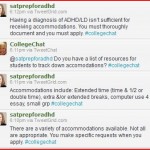 Jenn Cohen, a college test preparation expert for the SAT, PSAT and ACT, specializing in ADD/ADHD and special needs students, was a recent expert guest on #CollegeChat and provided tips for high school students with ADD/ADHD and other learning disabilities how to maximize their SAT and ACT scores through test preparation and making sure to secure test accomodations. During the one hour discussion, Jenn covered a number of topics including what types of accomodations are available and how to research them, how to determine which test is best for each student, how long to prepare for the test, and how to construct a test preparation plan. Jenn had a lot of great suggestions and you can read through the 31 page transcript here : adhd_transcript.
Jenn Cohen, a college test preparation expert for the SAT, PSAT and ACT, specializing in ADD/ADHD and special needs students, was a recent expert guest on #CollegeChat and provided tips for high school students with ADD/ADHD and other learning disabilities how to maximize their SAT and ACT scores through test preparation and making sure to secure test accomodations. During the one hour discussion, Jenn covered a number of topics including what types of accomodations are available and how to research them, how to determine which test is best for each student, how long to prepare for the test, and how to construct a test preparation plan. Jenn had a lot of great suggestions and you can read through the 31 page transcript here : adhd_transcript.
Transcript for #CollegeChat with Public Agenda on “Hiring and Higher Education”
Last night Allison Rizzolo, a communications professional for Public Agenda, a nonpartisan, nonprofit organization that helps communities and the nation solve tough public problems, discussed findings from a recent report “Hiring and Higher Education” conducted in conjunction with Committee for Economic Development (CED), during #CollegeChat. Allison provided us with detailed background from the research on why U.S. Business Leaders worry that skyrocketing tuition and a growing skills gap could have serious consequences for the nation’s economic future. Our discussion centered on the following questions:
- Business leaders cite cost of higher education as one of the major weaknesses. Why is this a weakness and what do they say causes these high costs?
- Executives also cited a shortage of graduates in STEM fields and their inability to fill many of these positions. Why is this a potential challenge for the nation’s economy?
- Some business leaders expressed concern that we over-emphasize 4-year degrees. What are their specific concerns and why is this a weakness?
- Executives reported unease about workers’ interpersonal skills. Why is this finding significant?
- Business leaders worried that higher education is too slow to recognize and implement needed changes, and not as accountable as it needs to be. What recommendations did they have to effect change? Q5
- What are the opinions regarding online education? Why is it significant that their attitudes are changing in respect to online education?
- How will the Public Agenda use these findings moving forward? What are the next steps?
- How did business leaders conceptualize they can be more involved in higher education?
You can read the entire transcript PublicAgendattranscript.
#CollegeChat: Public Agenda to Discuss U.S. Business Leaders Concern that Higher Ed’s Resistance to Change is Widening Skills Gap
New Research finds that U.S. Business Leaders worry that skyrocketing tuition and a growing skills gap could have serious consequences for the nation’s economic future
 Allison Rizzolo, a communications professional for Public Agenda, a nonpartisan, nonprofit organization that helps communities and the nation solve tough public problems, will discuss findings from a recent report “Hiring and Higher Education” conducted in conjunction with Committee for Economic Development (CED), during #CollegeChat on Twitter, April 17, 2012 at 9 p.m. Eastern.
Allison Rizzolo, a communications professional for Public Agenda, a nonpartisan, nonprofit organization that helps communities and the nation solve tough public problems, will discuss findings from a recent report “Hiring and Higher Education” conducted in conjunction with Committee for Economic Development (CED), during #CollegeChat on Twitter, April 17, 2012 at 9 p.m. Eastern.
THE CED and Public Agenda undertook this research “to explore the attitudes of business leaders toward higher education.” Rizzolo, https://twitter.com/#!/publicagenda , will discuss key findings from the report with #CollegeChat participants including:
- Cost of higher education is a major concern. The business leaders interviewed described the escalating cost as one of the major weaknesses of higher education.
- Shortage of graduates in STEM fields. The report found that business leaders cited a serious shortage in science, technology, engineering and math.
- Unease about workers’ interpersonal skills. Business leaders were uneasy about graduates’ lack of basic interpersonal skills. Executives complained about the character, interpersonal skills and comportment of young people they encountered.
- Resistance to change. Business leaders worried that higher education is too slow to recognize and implement needed changes, and not as accountable as it needs to be.
About Public Agenda
Public Agenda is a nonpartisan, nonprofit organization that helps communities and the nation solve tough public problems. It does this by illuminating people’s views and values, getting them working together on solutions, and building momentum for change. Public Agenda is fostering progress on a wide variety of critical issues, including K-12 and higher education, climate change and health care. Its goal is to contribute to a democracy in which problem solving triumphs over gridlock and inertia, and where public policy reflects the deliberations and values of the citizenry.
About #CollegeChat
#CollegeChat is a live bi-monthly conversation intended for teens, college students, parents, and higher education experts on Twitter. #CollegeChat takes place on the first and third Tuesday of the month at 6 p.m. PT/ 9 p.m. ET. Questions for each #CollegeChat edition can be sent to Theresa Smith, the moderator of #CollegeChat via http://Twitter.com/collegechat , by entering questions online on the CollegeChat Facebook page at http://ht.ly/1XIqV , or by email. More detailed information about signing up for Twitter and participating in #Collegechat can be found at http://pathwaypr.com/how-to-participate-in-a-twitter-chat .
